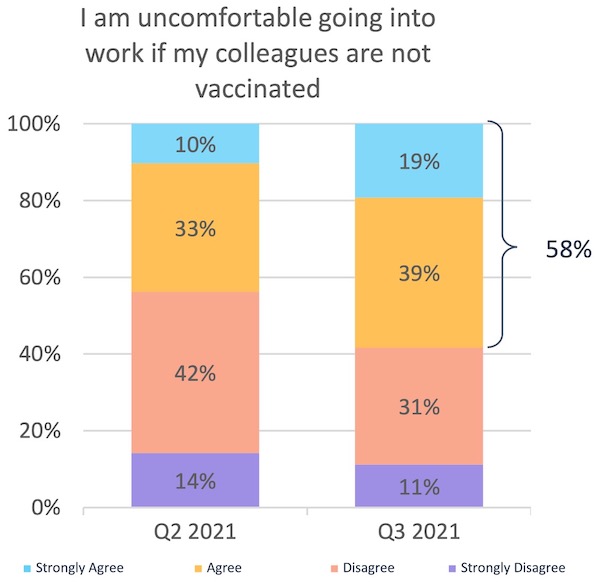Vaccine Mandates at Work and what your Employees Think
If you decide to mandate vaccines for staff in order to comply with the re-opening rules, are you going to be hit with a claim after December 1st? Data gathered from employees suggests you can approach your vaccine policy with confidence.
Bernadette Eichner

The past weeks have felt a bit like an episode of Squid Game, a Netflix drama where cash-strapped hopefuls sign up for something they don’t know about in a place they don’t know about to play a bunch of games they don’t know about until they are in it, all for the chance to win $38M. If they fail, they are ‘eliminated’ – I’ll leave what that means to your imagination.
We sometimes feel like we’re in something we don’t know anything about, with a set of rules that change almost daily and an unpredictable outcome for our health, our businesses and the world we once knew. The accepted way out is vaccination and we hope the ‘prize’ at the end is some return to normality.
Fortunately for us, if we don’t guess the game or understand the instructions we just remain confused rather than facing the fate of the Squid Game losers.
Depending on who you talk to, mandatory vaccination is either an inhumane breach of someone’s democratic rights or a public health initiative offering a ‘magic bullet’ that will protect the masses against severe illness and too often, untimely death, and save the economy.
To incentivise people to get vaccinated, the NSW State Government (while changing horses mid-stream) has embarked on a three-phase re-opening plan that favours fully vaccinated people from today.
Phase 1 and 2 of the plan requires employers to only roster vaccinated staff and only service fully vaccinated customers. It’s pretty clear what the rules are and it’s pretty clear what the fines are if we breach them. It’s also clear that businesses will be required to monitor vaccination statuses and refuse admission to anyone who isn’t fully vaccinated – in fact we stand to be fined if we don’t.
At the commencement of Phase 3 (the date of which is now a moveable feast), businesses then have the right to decide for themselves what their vaccination policy will be.
To achieve this, it has clearly fallen to businesses and employers to be the state’s ‘vaccination police’.
Owning a business just got a whole lot trickier in NSW
If you comply with the law on one level, are you breaching it at another?
If you decide to mandate vaccines for staff in order to comply with the re-opening rules, are you going to be hit with a claim after December 1st?
I’ve written in the past about the difficult position employers have been placed in when it comes to the question of vaccination and it doesn’t seem to have become any easier.
Over the past few weeks, I’ve been working shoulder to shoulder with a number of clients in hospitality and retail, helping them craft and implement their COVID-19 Vaccination Policy ahead of today’s ‘re-opening’ after 106 days of lockdown.
Due to the nature of their businesses, the majority of them have opted for mandating the vaccine as a work health and safety control measure, unless an employee has a certified medical exemption, in which case alternative work arrangements need to be discussed.
But this has resulted in some very emotional discussions with staff who choose to remain unvaccinated for ideological reasons.
One case, where a staff member has a number of the recognised and highly dangerous underlying health conditions but has an ideological opposition to vaccination, the decision to mandate staff vaccination means she has effectively lost her job. But on the other hand, it’s probably the thing that will keep her alive, given the business is totally reliant on customer-facing activities and therefore staff are at risk of coming into contact with COVID-19 at some point.
Tricky, isn’t it?
But there’s another perspective we need to consider.
What do employees think about vaccination?
It’s true that there are some employees who have opted for refusing the vaccine based on their own research and ideological position. And if you hang around the fringes of this group it could be easy to think that it’s a widespread movement that will ultimately create havoc for employers and have us all tied up in the courts for years to come.
But recent research tells a much different story.
According to the Elmo Software’s Employee Sentiment Report, employees overwhelmingly support their employers taking strong measures to protect them in the workplace with 70% saying they support mandatory vaccines, and 58% saying they would be uncomfortable working alongside an unvaccinated colleague. And the upward trend suggests these numbers will only increase.

And the same data says 88% of employees are OK with their employer knowing their vaccination status and 89% are happy to be required to show any COVID test status. This sort of puts the privacy concerns argument to bed (providing of course the information isn’t used for other purposes).
The question of vaccine passports has equal support with 79% of workers thinking it is a great idea and one they would happily comply with.

Can employees who don’t get vaccinated lose their job?
The short answer is Yes. And many already have.
The NSW State government has mandated vaccines for various public health and education workers and demanded it of the construction industry. The re-opening rules for many industries require a ‘no jab, no job’ approach until December 1st 2021 after which businesses can make their own decisions based on their operational needs and their WHS policy.
If a business is based on customer-facing activities and requires workers to work in close contact with each other to deliver that service, then the risk of COVID getting into the workplace from an unvaccinated customer or worker is increased.
This puts employers at risk of breaching their own WHS policy.
What is the Work Health and Safety argument?
Under WHS law, all employers or businesses are required to follow all government directives and public health orders (mandatory) and eliminate the risk of COVID where possible but next best, tightly manage the risk of COVID-19 to workers and others in the work environment. This means adopting high order risk control measures.
SafeWork NSW states clearly on its website that:
SafeWork NSW considers vaccination a high order risk control measure. When a COVID-19 vaccine is generally available, businesses may require workers to be vaccinated for COVID-19 if reasonably practicable to do so. A variety of factors such as eligibility for the vaccine, personal health, medical history, type of work and alternative control measures should be considered, along with the risk of exposure.
The question is how do you manage the risk without vaccination. You can isolate unvaccinated people in a separate part of the building. You can have people work from home and not have any contact with their co-workers. You can require unvaccinated people to wear masks when others don’t have to. But then you may be accused of engaging in ‘segregation’ (a new addition to the anti-vaxxer rhetoric). You may be inviting a ‘bullying by exclusion’ claim or a mental health work cover claim due to someone having to work in isolation and being excluded from company activities.
Some employees feel bullied
There have been some reports of employees feeling bullied by being required to even consider vaccination, and others have reported that they participated in the vaccination program because of peer pressure and a fear of disappointing their superiors.
This may be true – they may feel bullied and pressured. Whether providing employees with information about the vaccine and encouraging them to consider it is bullying will no doubt be legally tested at some point. While the Fair Work Act falls short of supporting vaccine mandates, it does state that it is completely reasonable to encourage employees to participate in what is a national health initiative in the interests of a safe workplace and safe community.
Best practice is to make sure that you communicate transparently and often, maintain an open-door policy for anyone who wishes to discuss their hesitancy or concerns, and ensure that the information you are providing is independent, empirically arrived at and peer reviewed.
And what about Anti-Discrimination?
Anti-Discrimination legislation around the country doesn’t mention vaccines. Age, gender, sexual preference, marital status, pregnancy, disability, caring responsibilities, ethnicity, religious affiliations are all covered but not your vaccination status.
The Human Rights Commission warns it would be discriminatory to refuse employment to someone who isn’t vaccinated due to a disability or a medical condition that would result in them having a serious adverse reaction.
But that’s covered by every workplace policy I’ve seen to date as those people would be exempt anyway – a medical exemption from a Medical Doctor is an acceptable reason to not have the jab.
The Privacy Act doesn’t seem to bother people
Some people I’ve spoken to in my numerous discussions these past weeks claim that demanding someone’s vaccination status or COVID test result is a breach of their privacy and therefore not allowed by law.
With 88% of people saying they would have no problem with their vaccination status being disclosed and kept on file at their place of work, we can assume they don’t feel this breaches their privacy in any way.
Like Squid Game, maybe we need to just throw ourselves in and see what happens
Like the characters in Squid Game, the way to win each ‘game’ is to look for the signs, listen to all the information and balance it up, decide who you can trust, hurl yourself in and don’t look back.
After each game review what you have learned and apply it to the next challenge. After all, no one really knows where this will end up. All we know is we want to be a winner.
Professional recruitment and fair pricing? Yes, it‘s possible!
At Just Right People Recruitment we‘ll give you the flexibility to choose between three different pricing models. And we guarantee each one will deliver a high-quality recruitment outcome tailored to your job, your budget and your specific needs. Now, that’s fair!
Learn more…Bernadette Eichner
Bernadette Eichner, Cofounder and CEO of Just Right People, is a recruitment industry entrepreneur and thought leader in Australia, totally committed to improving the recruiter experience for clients and candidates alike. Her secret to life is to “just do the next thing that needs to be done”.
Follow Bernadette

